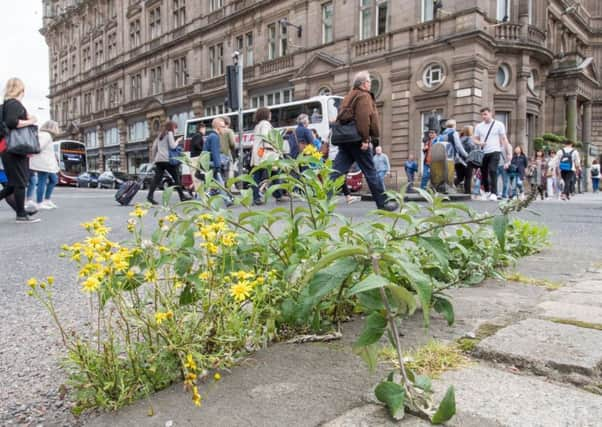Letter: Weeds have '˜marred our streets'


Citing a World Health Organisation report, the council took a decision to move towards abandoning the use of the rather effective but low toxicity weedkiller it had used for many years.
A report to the council’s Transport and Environment Committee earlier this month highlighted how difficult and expensive it has been to find alternatives.
Advertisement
Hide AdAdvertisement
Hide AdHowever, last week an investigation by Reuters journalists was published which appears to change the basis of banning the weedkiller. While the draft report stated there was no evidence the weedkiller was carcinogenic to humans when properly used, the journalists found ten occasions where that evidence was suppressed or reversed in the final report.
And it appears there is a wealth of other reports by international agencies which state there is no evidence sufficient to justify a ban on the weedkiller. It turns out it is rather less toxic than coffee!
I hope this will now lead the council back to more effective weed control on our streets and to review its earlier decision.
Cllr Cameron Rose, City Chambers, Edinburgh
Car speed limiters could help save lives
The government has pledged to make Britain ‘the safest place in the world to go online’, saying: “As a government we also have a duty to protect children and vulnerable people from the less-family friendly corners of the internet.”
Advertisement
Hide AdAdvertisement
Hide AdIf they can’t make simple public highways safe for children, and other vulnerable road users, how can they make the immensely complicated, so called super-highway safe?
To make the internet safer, the government will employ ‘technological solutions’.
Britain has been ‘at war’ against speeding/polluting drivers for decades and is still nowhere near winning: the latest road casualty figures show a 4% increase in road death. Also, 50,000 die each year from lung disease.
The ‘technological solution’ to winning the war against speeding/polluting drivers is surely satellite controlled speed limiters. Even 10mph limits would be adhered to, and children who want to cycle to school could enjoy the same benefits as children in The Netherlands, ie they could become ‘the happiest children in the world.’
Advertisement
Hide AdAdvertisement
Hide AdAlso, for people fighting obesity and poverty, (the rising cost of living, and spiralling debt), cycling surely ‘fits the bill’ for 50% of the population.
By employing speed limiters, they would serve as ‘traffic police’, and allow more police resources to be employed fighting child abuse, and terrorists. Also, speed bumps could be made ‘redundant’, making for smoother flowing and less polluting traffic and the money saved could fund the NHS.
Allan Ramsay, Radcliffe, Manchester
You have to take your hat off to King Olav
IN reference to your article on King Olav’s visit to Edinburgh (News, October 21), in October 1962 I was running my girlfriend home at about 1am along a deserted Great Junction Street Leith when I noticed several policemen at the road junctions.
Thinking, rightly as it turned out, that something was about to happen, I stopped the car and we got out. A darkened limousine approached from Ferry Road. The interior light was switched on and an elderly gentleman in naval uniform sat up, put on his hat, turned towards us and delivered a smart salute.
Advertisement
Hide AdAdvertisement
Hide AdYes an ordinary, young Scottish couple had been saluted by a reigning monarch. No wonder King Olav was such a popular person. It makes one wonder if a member of British royalty would have behaved in the same way.
Gordon Johnson, Saughton Road North, Edinburgh
Parents must keep right to chastise children
I am appalled at the Scottish Government’s ill-considered intention to ban the reasonable chastisement of children by their parents.
In my school days, corporal punishment was a way of distinguishing the sheep from the goats. It was only the brightest kids who realised that if an adult hit you, they had lost the argument and that you could continue what you were doing that had attracted their ire but with more discretion and care to avoid detection.
The thicker bairns, on the other hand, never made this connection and usually responded compliantly to a good belting.
Advertisement
Hide AdAdvertisement
Hide AdSince the tawse was abolished in Scottish schools, we have seen generations of feral children growing up into ill-mannered and loutish thugs.
The few decent parents who attempt to do what schools used to do will now be deprived of a viable means to control their lumpen offspring. And intelligent kids will miss out on a valuable lesson about adult psychology.
John Eoin Douglas, Spey Terrace, Edinburgh
Smacking euphemisms can’t hide child abuse
Defenders of hitting children always use playful euphemisms like ‘tap’, ‘clip’, ‘light smack’ and sometimes the delightfully couthy Scots ‘skelp’.
Those adults for whom hitting children was normalised in their own early years invariably use the face-palm inducing line “It never did me any harm.” Here’s a thought experiment: let’s find an adult who was NOT hit as a child but who now believes their parents were wrong and advocates hitting their own kids.
Neil Barber, Saughtonhall Drive, Edinburgh